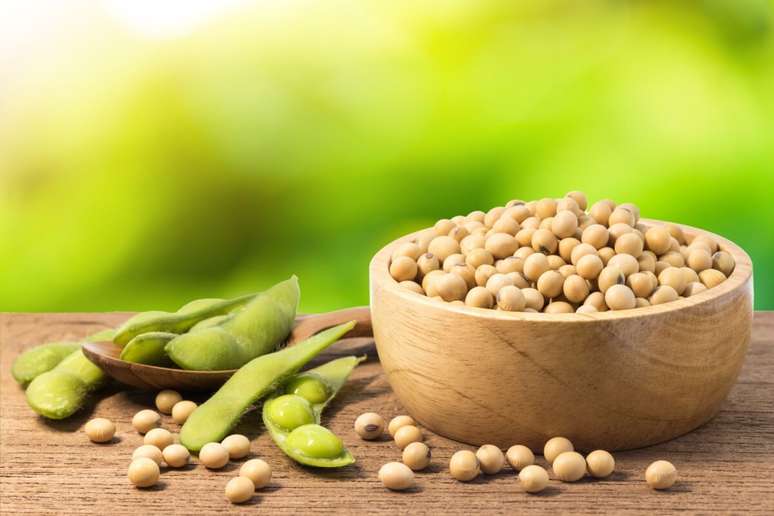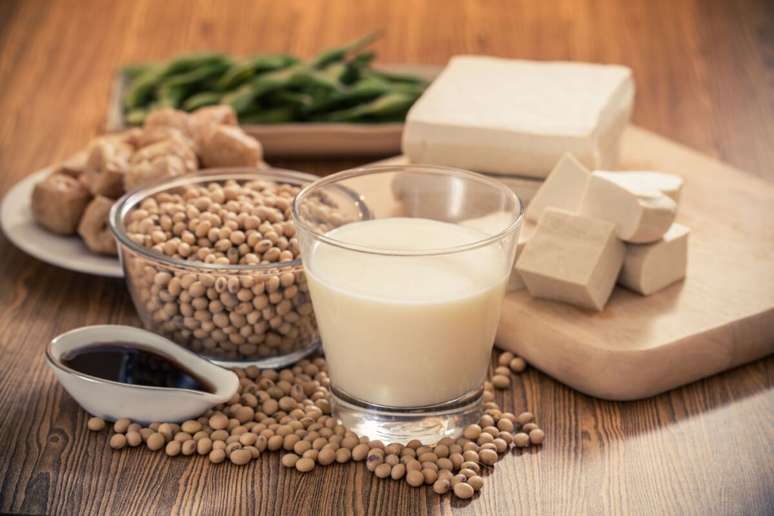With a very nutrient-rich composition, legumes help prevent diseases and help control weight
Native to East Asia, soybeans are classified as legumes, similar to beans, lentils, chickpeas and peas. Its reputation is attributed to its versatility and its complete nutritional richness. In the kitchen it can be found in different, natural forms, such as tofu, textured proteins and milk. This allows you to create a wide variety of recipes.
Thanks to its complete composition, the soy It is a rich source of protein, fibre, vitamins and minerals. These nutrients, in turn, help prevent cardiovascular, bone and hormonal diseases.
“Soy is considered a functional food, as it brings numerous health benefits as it is rich in vitamin A, B, C, D, E complexes, polyunsaturated fatty acids, such as omega 3 and 6, and minerals such as iron, sulphur, magnesium, copper, phosphorus, potassium, manganese and high protein content”, lists Sandra da Silva Maria, functional nutritionist.
Below, discover 7 health benefits of soy!
1. Helps prevent cardiovascular diseases
The frequent inclusion of soy in diet it can lead to a reduction in LDL (bad cholesterol) levels in the blood. This is due to the presence of phytosterols, isoflavones and fibers in soy, which contribute to the prevention of heart disease, as they improve the functioning of the arteries.
2. Relieves menopause symptoms
Soy is beneficial for menopausal women due to the presence of isoflavones, plant compounds that have a similar structure to estrogen, the female hormone. These can help reduce the frequency and intensity of symptoms such as hot flashes and night sweats.
3. Facilitates intestinal function
In addition to being rich in fibers, soy contains natural prebiotics, which serve as food for beneficial bacteria in the intestine. These play an essential role in regulating both the intestinal system and the immune system, contributing to the adequate absorption of nutrients.
According to nutritionist Fernando Castro, legumesThey contain fiber that “makes the intestine work properly to transport stool, as well as aiding cleansing, since insoluble fiber, when passing through the intestine, cleans residues from other foods,” he explains.
4. Protects the brain
The antioxidants, flavonoids and B vitamins found in soy provide protective effects on the brain, helping to improve cognitive function and reduce the risk of neurodegenerative diseases, such as Alzheimer’s. “Some nutrients such as omega 3, flavonoids, choline, B vitamins and vitamin D exert protective and repairing functions on neurological cells,” explains nutritionist Gabriela Mendes Taveiros.
5. Helps prevent osteoporosis
Soy is a source of calcium, magnesium and phosphorus, nutrients essential for bone health. Furthermore, the isoflavones present in soy have been associated with the reduction of bone loss, making it an important ally in the prevention of osteoporosis.

6. Helps with weight control
Thanks to its complete composition, with adequate quantities of proteins and fibre, soy consumption provides a feeling of satiety, helping to reduce the excessive consumption of high-calorie foods. “Soy has one of the highest amounts of protein, with approximately 34g of nutrients for every 100g of food,” adds nutritionist Dr. Marcella Garcez.
7. Helps fight premature aging
The plant compounds found in soy have effects positive on the skin, contributing to the reduction of the signs of premature aging and improving its appearance and vitality.
Beware of excessive consumption
Despite the many benefits For the health that legumes offer, soy consumption should be part of a balanced diet, avoiding excesses. This is because it contains compounds that can interfere with the absorption of minerals such as iron, zinc and calcium. This precaution is particularly important in vulnerable groups, such as the elderly, children and pregnant women.
“Regarding the recommended daily amount, it is suggested that a safe dose would be 200 g of tofu, 500 ml of soy milk or less than 50 g of toasted cereals (which would be equivalent to 50 mg of isoflavones per day),” explains the nutritionist Gabrieli Comachio.
Source: Terra
Ben Stock is a lifestyle journalist and author at Gossipify. He writes about topics such as health, wellness, travel, food and home decor. He provides practical advice and inspiration to improve well-being, keeps readers up to date with latest lifestyle news and trends, known for his engaging writing style, in-depth analysis and unique perspectives.








